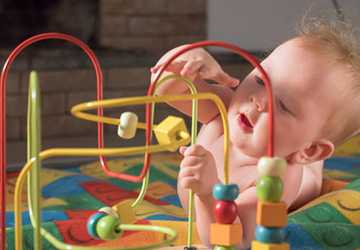Watching your baby grow and develop is an incredible experience. The first word, giggle or step, is the tiniest of achievements.
At some point in this journey, you may be wondering “whether the baby is growing as it should”

Learning the signs of healthy infant development is essential to guide a mother in this area. And what's more important than checking all the boxes in the list, knowing your baby's path in life, and providing them with the best start ever?
You will ensure your child is on track, be prepared to help them grow and know where to turn when you need assistance.
This blog post will explore five critical milestones for a growing infant. Read on for essential tips to help you become more confident in your parenting skills.
Here are five essential indicators that suggest your baby is as healthy as expected at their age. Remember, each child is different, and it is perfectly normal for your child not to achieve these milestones simultaneously as the other kids.
It is one of the most prominent indicators that can inform you about your baby's overall well-being. However, it is not just a matter of growing more prominent. It shows how your baby is faring in other aspects of life.
● Weight and height increase: During subsequent check-ups, the baby's health will be monitored to determine the growth curve. Progress is always good, especially if it is gradual and constant.
● Head circumference: This measurement is essential in the first year and relates to the first objective. It is a sign of brain development or what is more commonly referred to as brain maturation.
● Motor skills: Look for signs like lifting the head, turning over, or slowly sitting up.
These physical changes indicate that your baby is growing and developing well in response to adequate nutrition. Every new achievement, from reaching out for a toy to getting it to crawling, walking, or turning over, is a joyous occasion that highlights their increasing physical power and skills.
It is equally important to monitor your baby's physical development as it is to monitor their social and emotional development. What defines them is how they interact with society in the broader context.
● Smiles and responses: A baby's first genuine smile is one of the most memorable moments for any new parent. It expresses how your baby can identify you and respond to you.
● Interest in interactions: Observe how your baby starts showing signs of social interaction with other people and objects in their environment.
● Emotional range: Babies do not only make sounds when they are crying. Remember to follow signals such as joy, curiosity, and sometimes even frustration.
You will notice that as your baby grows and develops, they will show distinctive traits. All these interactions are critical in building relationships and emotional skills as one is in the future.
Cognitive development is a process that focuses on how the baby acquires knowledge and reasons for what is acquired and arrives at solutions. It is exciting to see how their little brains function.
● Recognition: Your baby can quickly identify those people and objects they know. This indicates that their memory is in the process of being shaped.
● Exploration: Let's see how they probe their environment. There is nothing wrong with curiosity, as it is a very healthy sign in developing one's cognition.
● Game responses: Some activities can be as simple as playing peek-a-boo with your child, which becomes more exciting as your infant develops.
It can be as basic as communicating with the baby, reading books, or giving them objects to manipulate. Also, acknowledge that with each encounter, one can learn something new and enhance their interpersonal skills.
It is essential to understand that your baby's development to become involved in communication begins much earlier than their first words. These initial efforts are necessary developmental milestones in developing effective communication.

● Babbling and cooing: These adorable sounds are your baby's first effort at enunciating various words and phrases.
● Sound responses: Observe your baby's response to various tones and sounds they are exposed to.
● Mimicry: In their development, babies attempt to imitate what they can hear. These sounds are used to exercise their speech organs.
It is essential to encourage your baby as they try to communicate at a very early age when you respond to these early attempts. It is also a fun and engaging process that builds your relationship and helps their growth.
Motor skills development is one process that enables your baby to learn how to control their body. It is the progression from the initial clumsy movements to coordinated and intentional actions.
● Reaching and grasping: Look as your baby begins stretching to touch objects with their hand and finally pick them up.
● Mobility milestones: Each step, from rolling over to crawling and walking, is significant for children.
● Hand-eye coordination: Pay attention to the development of the baby's motor skills and their progress in following the object with their eyes and extending their arms to grab it.
These skills demonstrate the steadiness and coordination of your baby's muscles. They are necessary for travel and for going out on one's own. Every single new ability is a world for your little one to discover.
Take action now and make the most of every moment! It is not merely a process of checking various boxes; it is about preparing the baby to become the best they can be.
Parents effectively watch these signs, and when such signs are observed, it is easier for parents to notice adverse occurrences that could have happened to their children.
It is essential to make frequent visits and discuss your concerns with your doctor to help you let go of them and simultaneously help your baby grow. Begin now; both you and your baby in the making will appreciate it later on!
Q. How often should I track my baby's development milestones?
Ans. It can be daily, but tracking can be monthly to ascertain the trend. Your paediatrician will monitor progress at good visits and help you determine if a child is on track. Remember, you know your baby, and always use your judgment to determine if something is right or wrong.
Q. What if my baby isn't meeting development milestones?
Ans. Do not worry; every child is unique and grows up differently. Talk to your paediatrician. They can inform you of an issue and walk you through the following steps.
Q. Can developmental delays be corrected?
Ans. It is important to emphasize that many of the discussed delays can be solved if the problem is tackled early. It is always advantageous to take swift action without delay. If you need further therapies or a specialist, your doctor will suggest the proper action.
Q. How can I support my baby's development at home?
Ans. Use spoken and written language frequently, speak, read, and engage in activities. Create an environment for subsequent searches. Offer age-appropriate toys. Make love and affection noticeable to them.